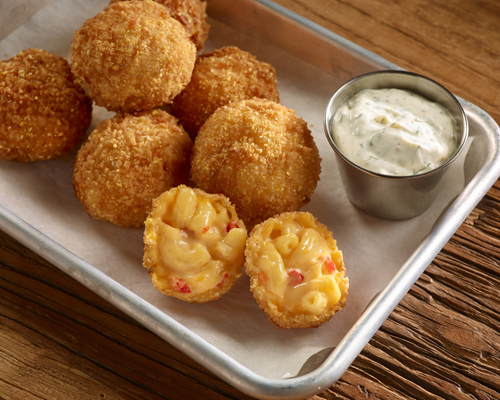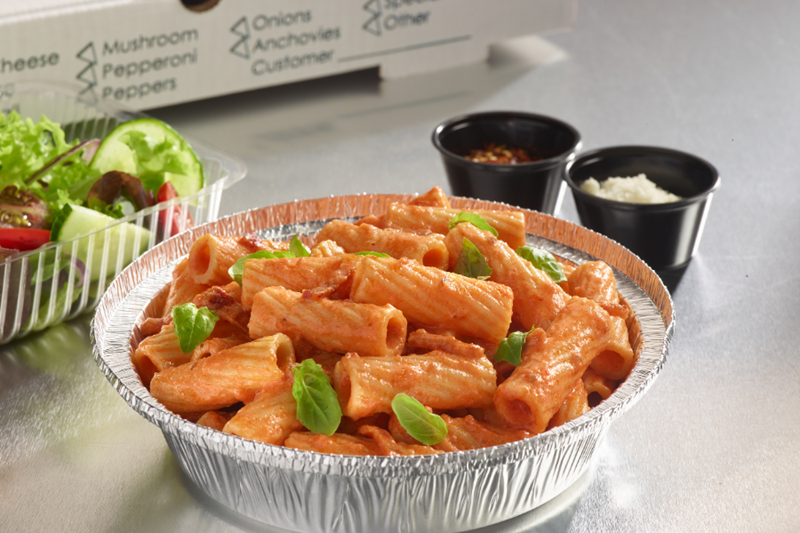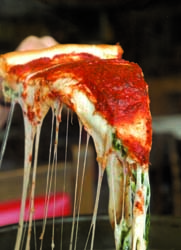 Travelers, whether they move to their destination by land, air or sea, often arrive at their hotels roadweary and hungry. And, more often than not, they ask their concierge for dining recommendations. Which means you need to cultivate a good relationship with the front desk staff members in your area.
Travelers, whether they move to their destination by land, air or sea, often arrive at their hotels roadweary and hungry. And, more often than not, they ask their concierge for dining recommendations. Which means you need to cultivate a good relationship with the front desk staff members in your area.
For pizza delivery, William J. Callnin, chairman and managing director of Cayuga Hospitality Advisors, Inc., in Virginia Beach, Virginia, said, “I believe if the product is top-notch, it only ties the hotel guest closer to the hotel by offering it to guests.” According to Charles Dorn, CCM, managing director of The Dorn Group Ltd., a hospitality consulting firm in Rye, New York, targeting hot spots as well as building and maintaining a good relationship with a hotel, specifically the front desk staff, are keys to bringing out-of-town business to your restaurant’s door.
“It depends on the level of the hotel. It’s extremely difficult to have a huge presence in a five-star hotel,” Dorn said. “For example, hotels like the Ritz Carlton or Four Seasons can produce a product similar in caliber because they have the staff. They may not have a strong relationship with local restaurants. They don’t want a pizza box walking in through their lobby.”
Claire Belilos, owner of CHIC Hospitality Consulting Services in Vancouver, British Columbia, agreed that outside restaurants may not find an easy recommendation from a luxury hotel that has an in-house restaurant or kitchen staff.
“In the past, large hotels forbade their front office staff, including concierges, from recommending ‘outside’ restaurants and food services, but rather asked them to encourage guests to enjoy meals in the different restaurants of the hotel itself,” Belilos said, adding that most upscale hotels did not allow food to be brought in from the outside, due to food sanitation purposes.
In order to get hotel guests’ business, Dorn suggests looking into different markets. “Take out the luxury hotels, and there is a huge market for business,” Dorn said.
According to Dorn, the number of orders an outside restaurant would receive from an upscale hotel is significantly lower than what you could get from other hotels in other markets. He recommends that operators look for hot spots like independently owned hotels; franchises where the operators will have more flexibility; new properties that are looking for relationships with local restaurants and properties that are somewhat isolated, such as large convention centers. He cautions that corporate-owned hotels may have strict rules about recommendations and a specific restaurant may have already cornered the market.
Once an operator has found the right establishment, developing a relationship is crucial. “Talk to the front desk manager, the general manager or the owner, depending on the size of the hotel,” Dorn said. “There must be a good working relationship between the restaurant and the hotel. The restaurant has to be able to work with the hotel and its rules. It can’t be a hands-off relationship. No two hotels are the same.
“There is no easy answer,” Dorn adds. “A local restaurant has to be aggressive. The bottom line is that the way to get to people is through their stomachs.” Dorn also said that a restaurant and a hotel can have a formal or informal relationship. He suggests that a way to establish an informal association is to offer the general managers or the owners a free meal for them or their staff, on specific occasions, like a staff meeting. “The hotel has to get something back,” Dorn says.
If the word-of-mouth recommendation is not possible, or even if it is, there is another way to get your restaurant noticed by guests at a hotel — paid advertising.
Belilos suggests operators contact management about advertising options in the hotel’s guest directory or magazine, which highlight places to visit in the city, as well as recommended establishments. Another advertising possibility is the in-house television channel that larger hotels use to advertise their own services and facilities, like the spa or shopping opportunities.
Dorn has even seen a menu or a table tent in the guest’s room as a promotional tool for a restaurant. “The F& B director would not appreciate the competition, of course. But in limited service hotels, I don’t see any problem if the products are simply advertised in guestrooms as an available service,” Callnin said.
All travelers deserve a good night’s sleep and a good meal. By discovering the right hotel to work with and establishing a profitable relationship, operators can start feeding weary travelers the second they ask the front desk staff, “Where can I get a good pizza around here?” ?
Talk to the front desk manager, the general manager or the owner, depending on the size of the hotel. There must be a good working relationship between the restaurant and the hotel. The restaurant has to be able to work with the hotel and its rules. It can’t be a hands-off relationship. No two hotels are the same.
DeAnn Owens is a freelance journalist living in Indianapolis. She specializes in features and human interest stories.



